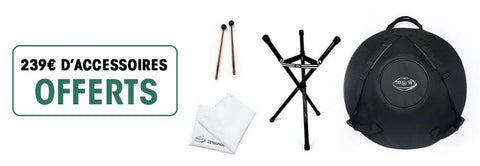Acquiring a handpan, this captivating percussion instrument, requires careful consideration, especially due to the variety of handpan prices, ranging from $700 to $3,500. Sound quality, a crucial criterion, varies significantly from one hang musical instrument to another, making the choice even more delicate.
To navigate this rich musical world, explore our expert tips for selecting your first hang hang instrument, whether it’s a new or used handpan drum, ensuring a wise investment in your musical and wellness journey. Discover how Zena-Drum can help you find the perfect instrument to start your adventure.
To read: How to maintain your Handpan ?
1. Which scale to choose for your handpan ?
Selecting the right scale for your handpan is crucial as it influences the instrument's overall sound and your emotional connection to the music.
a. What is the scale ?
The most important element of a handpan is its sound. This varies according to different criteria, such as the scale in which the instrument is tuned.
Musical definition of a scale: a set of different notes that follow one another. Here's how it looks on a score with the D minor scale :

Each scale has its own sound and emotion. It also depends on how it is played. There are, for example, happy, melancholy, relaxing or oriental scales. Everyone has their own way of interpreting the emotions conveyed by a scale.
b. The different scales
The major scale |
The minor scaleOur recommended selection |
Oriental scales
|
|
|
|
c. The preferred scale for beginners: D minor
In 90% of cases, a beginner will choose a handpan tuned in D minor. This is the most popular scale because it's easy to play. You can create beautiful, harmonious melodies with it.
Here's an example:
It has a hypnotic, relaxing quality. This is the range we recommend most for beginners.
Note : In the "Custom Handpan" category on our site, you can listen to the different scales.
2. Which frequency should I choose ? 432Hz or 440Hz ?
The sound of the handpan differs according to the frequency to which the instrument is tuned. Even if it's the same scale. The lower the frequency, the deeper the sound.
Musical definition of frequency: number of vibrations per second expressed in hertz.
Frequency 432hz |
Frequency 440Hz
|
| If you're looking to relax and are a fan of relaxation/yoga. | For playing with other instruments, in groups, or creating compositions. |
The 432Hz frequency is a symbol of life. It represents balance and is found in nature. Indeed, it's the same as the resonance of water. Some people say it has mystical virtues. Fans of meditation appreciate it enormously.

Important : It is not possible to play the handpan tuned to 432hz with any other instrument tuned to 440hz. It would sound wrong.
Hesitating between 432Hz and 440Hz ? Visit our selection to hear the difference and choose the handpan that resonates with your soul.
3. Choosing the right sustain for your handpan

a. What's sustain ?
This is the length of time an instrument holds a note after playing it. It's also called resonance. To illustrate: tapping on a wall will produce almost no resonance. Tapping on a bell, on the other hand, will produce a very long resonance:

It's the same with the handpan. Some have short sustain, others medium, others long. This is not a criterion of quality, but of taste. Generally speaking, a short sustain is more sought-after by experienced players or percussionists.
b. What kind of sustain for a beginner ?
Beginners find it easier to play with medium to long sustain. The duration of the notes allows you to "keep them alive" while continuing to create the rest of the melody.
This means easier playing. A medium-long sustain lends itself more to relaxation and meditation. It increases the hypnotic, soothing effect tenfold.
By choice, all Zena-Drum handpans have medium to long sustain.
4. Checking handpan sound quality

a. The balance of notes
Before buying a handpan, make sure that each note is equally balanced. In other words, each note must have the same sustain, timbre and quality. Otherwise, the music will be unbalanced and unpleasant to the ear.
With Zena-Drum, you don't have to worry about this, as each note of every handpan is checked twice: after manufacturing and right before shipping. This simplifies the process for you.

b. Crosstalk
This is interference between notes. When you play note 1, you don't want any sound from note 2 to come out. The separation zone must be well constructed. A poor quality handpan can produce unwanted interference and alter the quality of the sound.
There are, however, handpans with sympathetic interference. This can create a harmonious effect between certain notes. However, it's best reserved for experienced players.

You should order from a trusted manufacturer who ensures each note is perfectly isolated. Choose a craftsman with several years of experience, like those at Zena-Drum.

5. The manufacturing material
The material used in the construction of your pan drum instrument significantly impacts its sound quality, durability, and overall performance.
a. Nitrided steel vs. stainless steel
The 2 most common materials used to manufacture a handpan are nitrided steel and stainless steel.
Nitrided steel |
Stainless steel
|
|
|

b. Which steel for a beginner?
We advise beginners to choose a stainless steel handpan, as we believe it's the best choice.
You'll have a much more durable, easy-to-maintain instrument. And don't forget that the amplitude and sustain make for very pleasant playing.

6. How many notes to choose ?
It's important not to choose a handpan with too many notes. From 11, it will be more difficult for a beginner to handle. Below 9, you'll be frustrated not to have more musical possibilities.
a. A 10- or 9-note handpan for beginners
For beginners, it's best to choose a 10- or 9-notes handpan. Some people think 10 notes is too much. Playing will remain easy. What's more, you'll have greater scope for development. If you have the budget, go for a 10-note. If not, go for a 9-note.

b. Long-term alternative: the 17-notes handpan
Our 17 notes handpan is a good investment because it has 2 sides. One side has 9 notes, the other 8. Each side has its own sound. You can choose the side that best suits your mood.
The advantage is that as you progress, you can start playing with both sides at the same time. The price is higher, but you won't need to buy a second hang drum as you level up (long-term savings).
Video Responsive7. Handpan color: a matter of taste
The final criterion to choose handpan is aesthetics. This is a highly subjective aspect that requires your personal reflection. Simply select the color that appeals to you the most.
You can choose from dark colors like black and bronze, or opt for others that reflect the vibrancy of life, such as gold, green, and blue. Your handpan instrument should resonate with your visual preferences as much as your auditory ones.
Important: The color choice also depends on the type of steel used. Not all colors can be applied to both types of steel (nitrided and stainless). This consideration is crucial when selecting your perfect handpan drum from Zena-Drum.

To help you
Imagine which color would go best with the style of decoration you have at home: walls, objects and colors, for example.

Note: At Zena-Drum, the color has no impact on the sound of the handpan.
8. Order your first handpan
Begin your musical journey with a high-quality handpan from Zena-Drum, crafted to perfection for both beginners and experienced players.
a. Buy a Handpan at Zena-Drum
You have everything you need to order the right handpan. Just follow our tips and take action. Your future favorite instrument is waiting for you.
By ordering from Zena-Drum, you can be sure of receiving an instrument of excellent quality. This saves you the trouble of contacting multiple craftsmen. You don’t have to check the sustain, ensure there’s no interference between notes, and confirm they are well-balanced.
Additionally, you receive your handpan quickly in just 7 days. Save time by avoiding the 4-5 month wait times common with some manufacturers.
b. Gift: $30 discount with code GUIDE30
It's your turn to play beautiful music. Order your own handpan with this coupon. Use this $30 discount code: GUIDE30
Explore our unique collection of handpans and find the perfect scale to start your musical journey. Discover your ideal sound now. Choose my handpan now !
9. Recap of Essential Criteria for Choosing Your First Handpan
| Features | Description |
|---|---|
| Type of handpan | Beginner, expert, wellness, composition. |
| Handpan scale | Choose the notes that resonate with you. |
| Material | Nitrided steel for rich sound, stainless steel for durability. |
| Price |
Ranges from $700 to $3,500, influenced by quality and craftsmanship. |
|
Used or New |
Used handpans can be a more affordable option. |
| Specific tuning | 432 Hz for relaxation, 440 Hz for musical composition. |
Conclusion
Choosing your first handpan is an exciting musical adventure, involving thoughtful decisions about type, handpan scale, and more. By considering aspects such as budget, material, and specific tuning, you ensure a rewarding experience. Embrace this quest with curiosity and passion, and you’ll discover a world of well-being and creativity at your fingertips. Your musical journey starts now with Zena-Drum. Explore our handpan for sale options and find your perfect instrument today.
FAQs
1. How do I choose a handpan for beginners ?
When choosing a handpan for beginners, look for a model with a simple and popular scale like D Minor or Celtic Minor. These scales are easier to play and sound great. Check the handpan for sale options on Zena-Drum for beginner-friendly instruments.
2. What is the best scale for beginners handpan?
The best handpan scale for beginners is typically D Minor or Celtic Minor. These scales are versatile, intuitive, and produce harmonious sounds that are pleasing to play. Visit Zena-Drum to explore handpans with these beginner-friendly scales.
3. How do you know if a handpan is good?
A good handpan has clear, resonant notes with no buzzing or interference. The sustain should be long and stable, and the build quality should be excellent. At Zena-Drum, we ensure every handpan drum meets these standards, offering you high-quality instruments.
4. How much should I spend on a handpan?
A quality handpan typically costs between $700 and $3,500. The price depends on factors like craftsmanship, material, and tuning. Investing in a good instrument from Zena-Drum ensures you get a well-crafted handpan that meets your musical needs.
5. What materials are handpans made of?
Handpans are made from nitrided steel or stainless steel. Nitrided steel offers a warm, rich sound and increased durability, while stainless steel provides a brighter tone and rust resistance. Explore the different material options available at Zena-Drum to find the perfect handpan for you.




